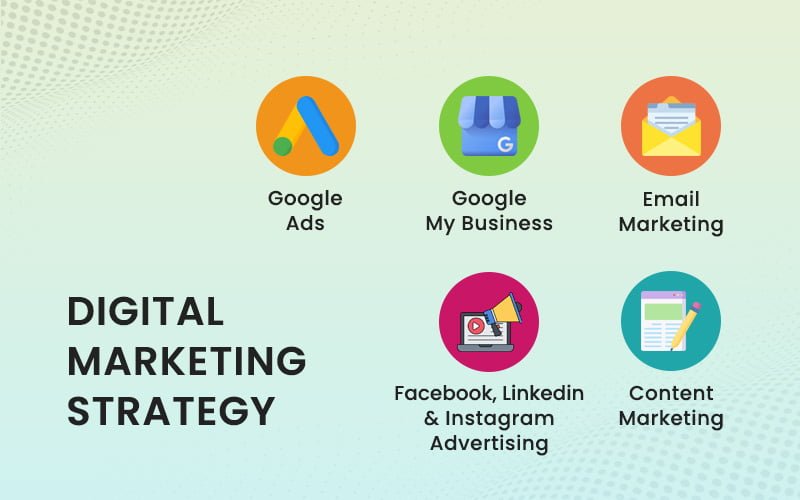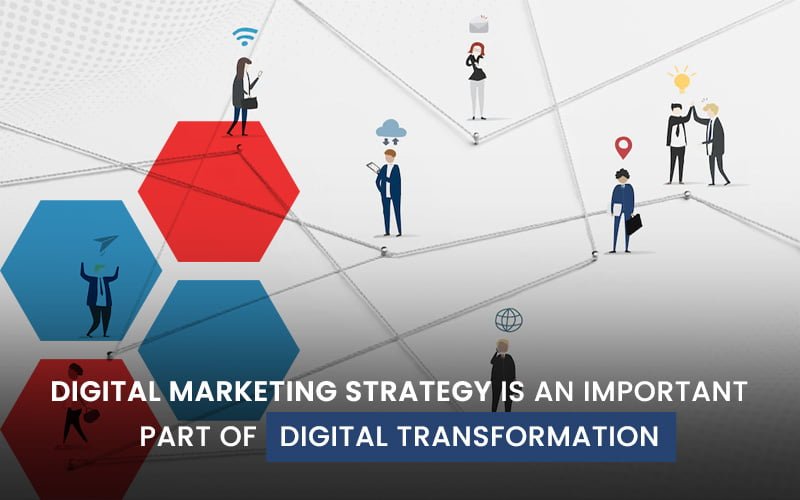It is all about leveraging digital technologies to gain a competitive advantage.
A digital marketing strategy is a critical component of digital transformation. It is a strategy for using digital marketing to achieve specific business objectives. The goal is to gain a competitive edge through the use of digital marketing.
The article that follows discusses the significance of digital marketing strategy in digital transformation. It explains what a digital marketing strategy is and why your company needs one.
What is a Digital Marketing strategy?

A digital marketing strategy is a plan devised by Digital Marketing Agency that helps your company achieve specific goals by utilizing carefully selected marketing channels such as paid, earned, and owned media. Running a digital marketing campaign without a strategy is similar to wandering around a new city without a GPS – you’re bound to make a number of erroneous turns, resulting in distress and a useless long route to your destination.
Why do you need a digital marketing strategy?
Regardless of industry or work, here are the top 5 undeniable reasons why your brand requires a well-defined digital marketing strategy to attract more visitors, leads, and convert them into customers.
1. Strategy provides direction
Many businesses that do not have an online marketing strategy lack clear strategic goals. This makes allocating sufficient resources to individual marketing activities difficult, and it’s even more difficult to measure whether you’re hitting your targets using analytics.
Companies that do not have a digital strategy (and many that do) lack a clear strategic goal for what they want to achieve online in terms of gaining new customers or deepening relationships with existing ones.
2. Better understanding of market share
If you don’t have a clear strategy, you could easily underestimate the demand for your digital services. Furthermore, you are able to fully comprehend the dynamics of the online marketplace, including customer behaviors, competitors, and customer profiles.
If you haven’t done any research, you may be underestimating customer demand for online services. The dynamics will differ from traditional channels due to differences in customer profile and behavior, competitors, propositions, and marketing communication options.
3. Assists in developing an effective value proposition.
The online market is extremely competitive. To succeed, you must distinguish yourself and stand out from the crowd. Only a well-planned digital marketing strategy can assist you in this.
A strictly delineated digital value proposition tailored to your different target customer personas will help you differentiate your online service, encouraging existing and new customers to engage initially and remain loyal.
4. Comprehend your clients more clearly
Analytics will not help you understand your digital customers on their own. Other types of website feedback tools must be used to identify and address your weaknesses. Strategizing and planning play an important role in this.
5. DON’T DOUBLE UP! Save time and resources!
Even if you have enough resources, they may be squandered. This is especially true in larger organizations, where different parts of the marketing organization may purchase different tools or hire different agencies to perform similar online marketing tasks.
To plan, manage, and optimize your digital channels and platforms, you must invest in a marketing strategy that works for you and your team. Drive the marketing results you require to meet your business objectives and increase your marketing ROI.
5 Essential Elements of Creating a Digital Marketing Strategy

The following are the five most important aspects of developing a successful digital marketing strategy. Additional components to consider when developing a well-rounded, comprehensive strategy are listed below:
1. Set Your Goals
When planning an itinerary, you have a destination in mind. An internet marketing strategy’s destination is a set of defined marketing goals that you hope to achieve through your efforts.
These marketing objectives should be linked to your company’s fundamental goals. Whatever your objective, you must ensure that you are tracking your progress.
2. Understanding Your Target Market
It is necessary to understand your target audience, demographics, and the psychology of existing and new customers. Before making a purchase and, ideally, becoming a long-term customer, a potential buyer goes through several steps.
Although the stages differ, they usually start with brand awareness and education, progress to the consideration phase, and finally end with a decision and sales conversion.
3. Content Marketing That Works
You can’t just scribble anything or “spray and pray.” You must be strategic about what you write about, which words you want to own, implement an SEO keyword strategy, and consider continuous content optimization.
Work out the content that you will share via Social Media Marketing Services. After all, content is the king!
4. Create Your Ideal Customer Profile
Create buyer personas so you know exactly who you want to speak with and that they are interested in speaking with you.
Remember that your personas should be based on research. Avoid stereotypes by investigating factual insights with tools like Facebook Audience Insights and Google Analytics.
5. Get Your Message Right
Make your messaging relevant to the audience you’re attempting to reach. The voice and content of your campaign should speak to them in a way that they can understand. This is where all of your prior research and planning will come full circle.
If you know where they are in the sales funnel, you should know where to start the conversation. If they are unfamiliar with you (prospecting stage), you should begin by establishing your expertise and earning their trust.
You should be aware of their pain points and be able to explain how you can help them if you’ve identified their buyer persona and are selling a service.
Planning a digital marketing strategy is not difficult. You simply need to define your goals, tactics, and KPIs and document them.
Businesses not only have well-defined strategies, but they also spend money on them on a regular basis. In 2021, global digital advertising spending will total 521.02 billion US dollars ( Statista ). If you do not work on developing digital marketing strategies, your company will undoubtedly fall behind its competitors.
